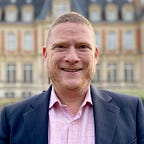Smart Cities considered harmful #2
Why do universities ask students to study and write about Smart Cities? The very idea is enmeshed in an ideology that cities are still the answer, that they are inevitable, that we have to live all in the same place so that we can leverage resources: food, power, water, production: offices and jobs.
But that was before Covid.
Now the city is deserted, the office blocks empty. I’m typing this on my kitchen table. My flat doesn’t have a study or spare bedroom. Such is the cost of living in London. I’m fully aware that people my age move out of the city into the suburbs, or if they’re lucky, into the country. I was never going to be ‘that guy’.
There were lots of versions of ‘that guy’ that I wasn’t going to be: One version I wasn’t going to be was a leather queen. At 26 a work colleague sold me his motorbike for £200 (the BEST! way of navigating and getting to know London intimately), and I’ve been wearing leather ever since. The other guy I wasn’t going to be was a serial relationshiper. Moving from one person to the next every five years or so. Why am I saying this? Because moving to London, or any big city, is about meeting amazing people and being who you want to be.
Moving to London in the late 80s was incredibly thrilling. With no money, one night out in Soho I met a whole group of friends that became close knit for years afterwards. We went out every night in our twenties. We weren’t just consumers, we were creators: creating fashion shows, running night clubs, organising Pride events, doing the graphics, advertising and press (that was me) for all of gay Soho and London, and organising inclusive sports events every weekend. We gave as much as we took and it was a win-win. Chilling out in Compton Street 24-hour Café at 4am in the morning watching the world go by in our City.
It was in those days that I met ‘Ritchie’ (the main character in It’s a Sin) and was swept off my feet. A couple of years after he passed I volunteered with WestEnd Cares charity, without even knowing that he was the inspiration. It’s great to see that after all this time, Be More Jill has become a meme.
Watching the series last weekend hammered home how I felt in those first years in London. I had no idea that I would find such friendship and love from strangers, in a way I could never have imagined. And how we lived in fear — not of catching AIDS, but of being ‘rescued’ by our parents, taken away from friends, from our City, and left to die smothered in our childhood bedrooms by people who didn’t understand us and couldn’t help but judge us (whilst secretly blaming themselves “for the way you turned out”).
We said we came to the City for work — and we did. My first job in computer graphics provided me with a machine half the size of my flat, that could do photo-retouching before photoshop was even dreamed of. My actor friends certainly came to London for the West End. But we also came to meet the person of our dreams.
Every street was exciting, every tube journey. You never knew when you would make a connection. I remember walking up Tottenham Court Road, and there was a complete blackout, which led to a romantic encounter. Another time I was walking back from Hyde Park in muddy softball kit, I bumped into two friends who invited me to a party. It wasn’t until I’d entered the room that I saw it was a black tie event for a celebrity, with guests like The Pet Shop Boys and a jazz band on a suspended walkway above my head. Dressed so differently, everyone seemed to want to talk to me.
The West End is quiet now. Clubs, where the best DJs in the world drove the move of a thousand people on the dance floor with their shirts off, pulsating to the music, died long before covid, pushed out by property developers, or the people were just too exhausted by work, trying to keep up in an ever increasing expensive city. I hope this won’t be forever. I hope that after the lockdown (if there is an after) people will remember what was great about being in a city, what they came here for, and create spaces and experiences that you only find in a city.
But, for now, I’m bowing out, and moving to the country. I’m taking my job with me, though not my partner. The music has gone quiet, and there are no events, bars or clubs to make me regret my decision. Yet.
